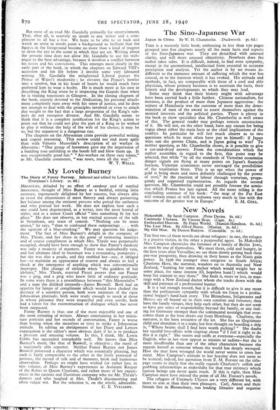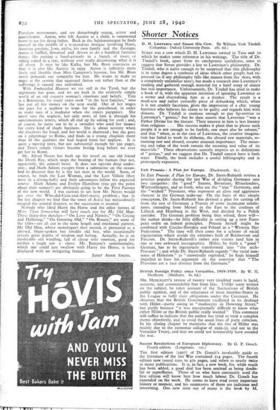New Novels
Makeshift. By Sarah Campion. (Peter Davies. 8s. 6d.)
Untimely Ulysses. By Vincent Brun. (Cape. 8s.)
Embezzled Heaven. By Franz Werfel. (Hamish Hamilton. 88.6(1.) The Last Man. By Alfred Noyes. (Murray. 7s. 641.) My Old Man. By Damon Runyon. (Constable. 7s. 6c1.)
THE first two of these novels are about refugees : in one, the refugee is a passive victim, in the other a purposeful agent. In Makeshift Miss Campion chronicles the fortunes of a family of Berlin Jews, as seen by one of themselves. We meet them, cold and hungry, in the first years after Versailles; we see them slowly getting back their pre-war prosperity, then drawing in their horns as the Nazis gain power. In 1936 the younger ones emigrate to South Africa; Charlotte Herz, the narrator, wanders on to Australia and New Zealand, " hunting for some anchor which would weight her to some place, for some interest (0, hopeless hunt!) which would keep her content to stay there." She finds it, more or less, in mar- riage with a New Zealand doctor whom she tracks down with the skill and patience of a professional hunter.
It is a sad enough record, but it is difficult to give it any more than the perfunctory sympathy with which we listen to a profes- sional beggar's hard-luck story. The Bliimchens, Seligmanns and Herzes are all bound up in their own comfort and fortunes; they have the family virtues, they help each other, but they do not seem to have any sense of responsibility beyond the family, or any feel- ing for Germany stronger than the sentimental nostalgia that over- comes them as the boat draws out from Hamburg. Charlotte, the narrator, is the least attractive of the lot. She has an illegitimate child and abandons it in a train; her first thought on boarding a ship is, " Whose brains shall I find here worth picking? " She daubs her squalid love-affairs with claptrap about " if I feel it right to do this it is right." She sneers and sniffs at everyone—especially the English, who in her view appear as ninnies or sadists—but she is more insufferable than any of the other characters because she regards herself as someone whom the world has deeply wronged. How she. may have wronged the world never seems to cross her mind. Miss Campion's attitude to her heroine does not seem to be ironical; indeed, her quotation from E. M. Forster on the title- page seems to imply that she really regards Charlotte's selfish and grabbing relationships as makeshifts for that true intimacy which human beings can never quite reach. If this is right, then Miss Campion must have missed the point of all Mr. Forster's novels.
The refugees of Untimely Ulysses are a very different lot, with more to aim at than their own pleasures. Carl, Anton and their friends live in Bloomsbury, run lending libraries and organise
Freedom movements, and are disturbingly young, active and quarrelsome. Anton, who left Austria as a child, is summoned home to see his dying father. Back in the Salzkammergut he finds himself in the middle of a tremendous intrigue involving Nazis, Austrian patriots, Jews, exiles, his own family and the Gestapo. Anton is baffled, thwarted and driven to do a hundred fantastic things, like putting a hand-grenade in a bunch of roses, Ls riding naked in a taxi, without ever really discovering what it is all about. It may be like Kafka, but Mr. Brun convinces us that it is also like Austria in 1939. Anton is infinitely more lively and likeable than Miss Campion's heroine, but Mr. Brun never demands our sympathy for him. He wants to make us angry at the system that squeezed Anton out rather than at the sufferings it caused one individual.
With Embezzled Heaven we are still in the Tyrol, but the nightmare has gone, and we are back in the relatively simple world of an old country woman's emotions and beliefs. Teta
is a Bohemian, for many years cook " in the best families," who has put all her money on -the next world. Out of her wages she pays for a nephew to train for the priesthood, in order to make sure of a mediator when she enters purgatory. She never sees the nephew, her only news of him is through his sanctimonious letters, which all end up by asking for cash ; and, of course, he turns out to be a swindler who used her money for every kind of shady business. She is about seventy when she discovers the fraud, and her world is shattered ; but she goes on a pilgrimage to Rome, and finds in a young chaplain more than all the qualities she had hoped from her nephew. It is quite a moving story, but not substantial enough for 35o pages, and Teta's simple virtues become boring long before we ever get her to Rome.
Mr. Alfred Noyes has built up his novel on our old friend the Death Ray, which stops the beating of the human (but not, apparently, the animal) heart. It does not operate deep under- seas ; and Mark Adams escapes from a submarine on the ocean- bed to discover that he is the last man in the world. Soon, of course, he finds the Last Woman, and the Last Villain (they were in a diving-bell); and their adventures follow the expected course. Mark Adams and Evelyn Hamilton (you get the point about their names?) are obviously going to be the First Parents of the new world. I was curious to see how Mr. Noyes would get over the Who-did-Cain-and-Abel-marry problem ; but in the last chapter we find that the town of Assisi has miraculously escaped the general disaster, so the succession is assured.
Nobody who liked Harry the Horse and the other heroes of More Than Somewhat will have much use for My Old Man. These thirty-five sketches—" On Love and Nitwits," " On Crying and Hollering," " On Growing Old," " On Beauty," are some of the titles—are all cut to the same length and emotional pattern. My Old Man, whose monologues they record, is presented as a shrewd, blunt-spoken but lovable old boy, who occasionally reveals great depths of wisdom and feeling. Actually, he is an intolerable old windbag, full of cheap trite emotion, good for neither a laugh nor a cheer. Mr. Runyon's sentimentality, which one could just swallow with Harry the Horse, is here displayed with no mitigating feature.
JANET ADAM SMITH.



























 Previous page
Previous page